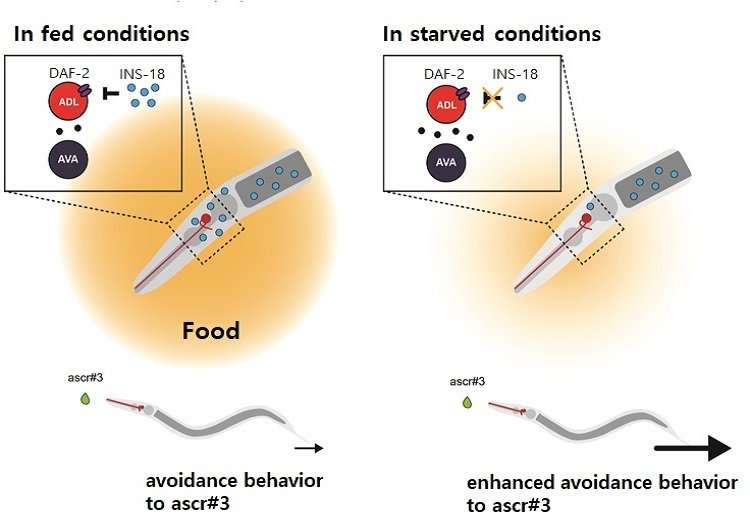New study reveals the cause of sensory changes in starved state

Korean researchers have verified the correlation between animals' sensory nerve activation and behavioral changes caused by insulin secretion in a feeding state. The result provided a clue to identify the causes of unusual sensory organ changes due to insulin-related metabolic syndrome such as diabetes.
A research team led by Professor Kyuhyung Kim at the Department of Brain and Cognitive Sciences has confirmed the mechanism of behavioral changes when an animal feels starved or fed.
Animals in a starved condition increase the frequency of certain behaviors such as looking for food, which facilitates survival. Although the state of feeling starved or fed is an important factor causing behavioral change, which neurotransmitter among sensory organs has not been known in detail yet.
Professor Kim's team used Caenorhabditis elegans, which has a relatively simple nervous systems and known neural circuit structure. By applying the avoidance behavior of Caenorhabditis elegans when it detects certain pheromone, the research team succeeded in clarifying the mechanism of certain behavioral changes in fed and starved conditions.
The research team first discovered that the pheromone avoidance behavior of Caenorhabditis elegans increases in a starved condition. At the same time, the team found that insulin receptors adjust the amount of neurotransmitter delivered to the lower association neurons from sensory neurons that detect pheromones, increasing the avoidance behavior.
Furthermore, the researchers identified that insulin-like peptide is released from the intestine of Caenorhabditis elegans, controlling the insulin-like receptor function of the pheromone-sensing neuron. The team also verified that the amount of insulin-like peptide secretion is adjusted depending on the starved condition and influences the animals' behavioral changes.
The results could clarify the causes and treatment of sensory organ abnormality discovered in the initial stages of metabolic syndromes such as diabetes.
Professor Kyuhyung Kim said, "Feeding state influences the sensory organs of animals and induces behavioral changes, but its exact mechanism has not been clarified yet. This research was a great opportunity to find out how the interactions between animals' feeding state and sensory neurons increase animals' survival."
This study was published on August 1 in The EMBO Journal.
More information: Leesun Ryu et al. Feeding state regulates pheromone‐mediated avoidance behavior via the insulin signaling pathway inCaenorhabditis elegans, The EMBO Journal (2018). DOI: 10.15252/embj.201798402


















